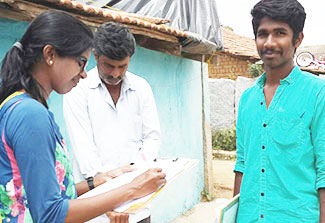Grantees study masculine norms to reduce violence
January/ February 2022 | Volume 21 Number 1
 Photo by Dr. William Story, University of Iowa College of Public Health
Researchers in India are examining the cultural norms of masculinity—especially among male youths—to see if they can find ways to reduce intimate partner violence.
Photo by Dr. William Story, University of Iowa College of Public Health
Researchers in India are examining the cultural norms of masculinity—especially among male youths—to see if they can find ways to reduce intimate partner violence.
In India, one in three married women has experienced intimate partner violence (IPV), which is escalating in newly settled rural areas nearest the cities. A U.S.-Indian collaboration funded by Fogarty is developing male-focused strategies to reduce IPV in Bangalore’s peri-urban neighborhoods. “Instead of seeing men as perpetrators, they must be included in the conversation and become part of the solution,” said Dr. Nancy Angeline Gnanaselvam of Saint John’s Medical College, co-Principal Investigator (PI) of the project.
To create an intervention that will shift masculine norms, especially among youth, the researchers are first gathering information about the underlying concepts of masculinity and how they are formed. This is done by interviewing youth and adults and holding group discussions about who they look up to and how they learned to behave as a husband or wife. In patriarchal societies, men often have greater power in marital relationships, something their male children observe and may model, the researchers noted.
“Both men and women uphold masculine norms. Men have an idea of what a man should be, but women also have an idea. And those ideas are embedded within every culture,” said Co-PI Dr. William Story of the University of Iowa. Swift urbanization in the neighborhoods they are studying has led to substantial income disparities, a threat for many men. “We’re wondering if this challenge to masculine identity is causing some men to act out in ways that may be harmful to women?” said Story. “This is why peri-urban areas interest us. Bangalore is not the only place seeing rapid urbanization—it’s happening everywhere.” Engaging men in research involves recruiting them, a difficult task in India, said Gnanaselvam. “They ask so many questions: Why are you doing this study? Who is funding the study? Why should I take part?” Each man is aware that others may criticize him for participating so researchers are careful to conduct interviews in privacy, she added.
Beyond recruitment, there’s the broader issue of health professionals becoming involved in IPV, a hot-button issue. In a busy practice, rarely, if ever, do doctors or nurses address couples whose relationships are marked by violence to try and prevent it, said Gnanaselvam. “It’s the need of the hour for health care professionals to come into the picture. In the spectrum of gender-based violence, there are multiple outcomes including homicide and suicide. The legal system penalizes and criminalizes the act, however the health care system should focus on provision of mental health support to both the husbands and wives.”
An important prerequisite to the research is capacity building, said Gnanaselvam. “Health care workers in India don’t have adequate knowledge of preventive measures or the necessary skills to address IPV.” The team from Iowa has taught faculty and staff at St. John’s about different aspects of intimate partner violence, including gender norms, masculine identity and mental health factors. During interaction with couples, the research team also learned about emotional, psychological and economic violence—“milder” mistreatment some see as acceptable within marriage.
“A workshop gave us a practical step-by-step approach when addressing a sensitive topic or approaching individuals who have experienced IPV or abuse,” said Gnanaselvam. They also explored ethical issues. “Both our knowledge and our research skills improved.”
While the pandemic has slowed progress, a COVID-19 supplement is enabling them to examine how the pandemic is impacting IPV. The team looks forward to coming up with community-accepted strategies that can actually prevent IPV, said Gnanaselvam. “Ultimately, we want to make sure men advocate and promote women’s health and children’s health as much as possible because around the globe where we see women and children thriving, we usually see communities that are really thriving,” said Story. The project is funded through an exploratory research grant from Fogarty’s Global Noncommunicable Diseases and Injuries Across the Lifespan program.
More Information
To view Adobe PDF files,
download current, free accessible plug-ins from Adobe's website.
Related Fogarty Programs
Related World Regions / Countries
Related Global Health Research Topics